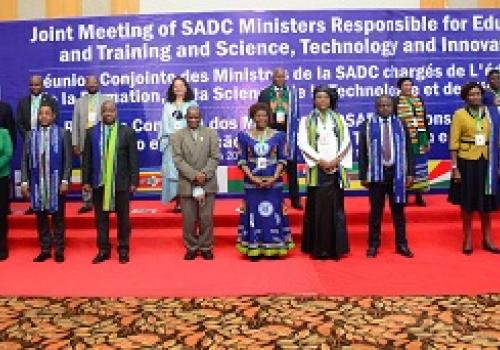The Ministers responsible for Education and Training and Science, Technology and Innovation (ET-STI) from the Southern African Development Community (SADC) have called for increased investments in the sector. The call was made during the SADC Joint Meeting of Ministers responsible for ET-STI held on 17 June, 2022 in Lilongwe, Republic of Malawi. During the meeting, the Ministers reviewed progress on the implementation of the 2021 Joint ET-STI Decisions and the Protocol on Science, Technology and Innovation which aim to foster cooperation and promote the development and transfer of science, technology and innovation within Member States.
The ministerial meeting was chaired by Honourable Agnes NyaLonje, the Minister of Education of the Republic of Malawi and Chairperson of the Joint Meeting of Ministers Responsible for ET-STI and was attended by Ministers or representatives from 14 out of the 16 Member States; and representatives from International Cooperating Partners. In her opening remarks, Hon. NyaLonje emphasised the importance of the meeting, stating that SADC must use gatherings such as the Joint ET-STI Ministerial Meeting to embrace and identify opportunities and to make the case for massive investment in education and training and in science, technology and innovation for the future. She urged Member States to combine efforts and link with national, regional and global partnership efforts that are beginning to see ET-STI as a central pillar to meet national, regional and global challenges.
The SADC Deputy Executive Secretary for Regional Integration Dr Thembinkosi Mhlongo commended the region for progress in adopting science, technology and innovation policies such as the establishment of institutional mechanisms and instruments to support national systems of innovation such as innovation parks, hubs, research and technology centres and organisations focusing on various scientific fields, research and innovation funds, and increased international cooperation in research and innovation through joint collaborative partnerships and programmes. Dr Mhlongo highlighted the need for Governments and the private sector to increase investments for research and innovation through supporting local institutions for higher learning, research and technology organisations.
The meeting took place against the backdrop of the effects of the COVID-19 pandemic on regional education systems and structures and the adverse effects of climate change on the Region’s socio-economic status. In reviewing the Follow-Up Report on SADC Member States Education Sector Response to COVID-19, Ministers resolved to request the United Nations Educational Science Cultural Organisation (UNESCO) to continue providing support to Member States in implementing innovation and technology solutions in responding to the impact of COVID-19. The Ministers urged Member States to invest in supporting local innovations and technology solutions to support teaching and learning.
Support for educational systems was further discussed and several strategic plans were approved for implementation, namely the Draft Regional Open and Distance Learning (ODL) Strategic Plan (2022-2030), the Regional Education for Sustainable Development (ESD) Strategic Framework, the Regional Research Ethics Guidelines and Toolkit. The Ministers noted the progress made on several key initiatives such as the SADC Cyber-Infrastructure Framework, the SADC Science, Technology and Innovation Measurement and the Regional Indigenous Knowledge Systems Programme. The Ministers directed SADC Secretariat to encourage Member States to support and implement the approved policy tools and instruments through technical support and capacity building interventions.
The Ministers expressed concern at the number of Member States which are yet to fully implement the SADC Charter on Women in Science, Engineering and Technology; which was approved in 2017 currently, only 10 Member States have signed the Charter. The Ministers noted the various initiatives being implemented at national, regional, continental and international levels to support innovation and technology ecosystems and urged Member States to conduct country assessments on innovation and technology capacities and needs in order to strengthen science, technology and innovation policies and funding to support innovation ecosystems.
With regards to the implementation of the SADC Protocol of Education and Training, the Ministers commended Mauritius for successfully aligning her National Qualifications Framework to the SADC Qualifications Framework (SADCQF). Further to this, Ministers approved the SADC Qualifications Recognition Manual as an important component of the SADCQF implementation strategy which is seen as an innovative tool that sets clear and uniform standards for recognition practice in the Region, and commended the support of the European Training Foundation (ETF) under the African Qualifications Framework.
The Minsters underscored the importance of Technical Vocational Education and Training (TVET) in SADC Member States and urged the Secretariat to continue its engagement with International Cooperating Partners to secure funding for a regional programme geared towards promoting Member States’ skills development to advance the Region’s Industrialisation Strategy. Guidelines such as the Draft SADC School Feeding Guidelines and Proposed Regional Indicators and the Draft Child and Youth Participation Framework were approved for implementation in efforts to mainstream care and support in the education sector.

